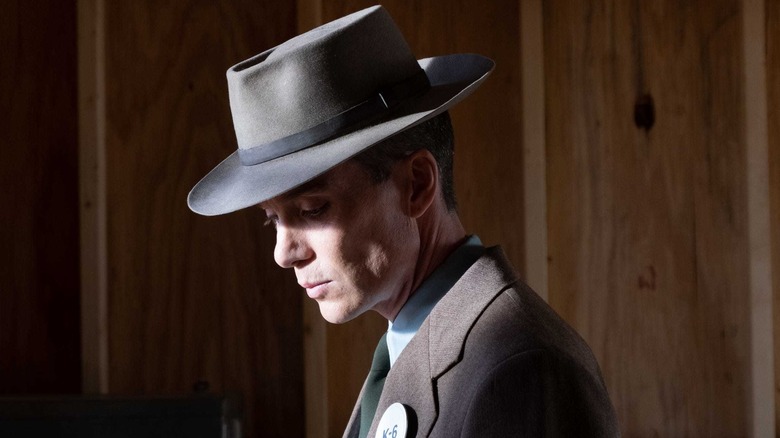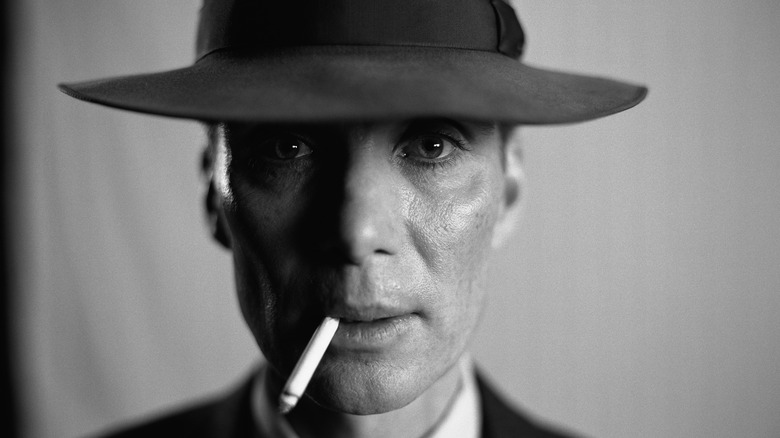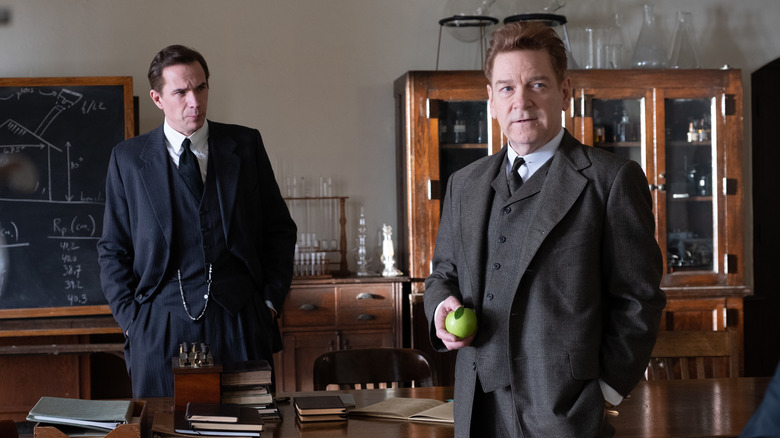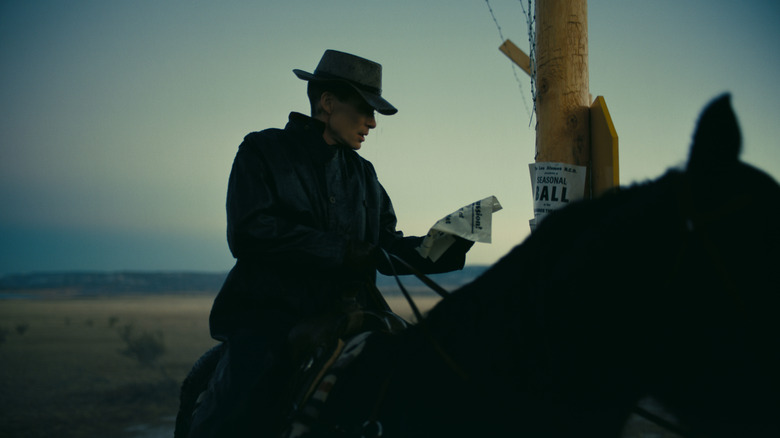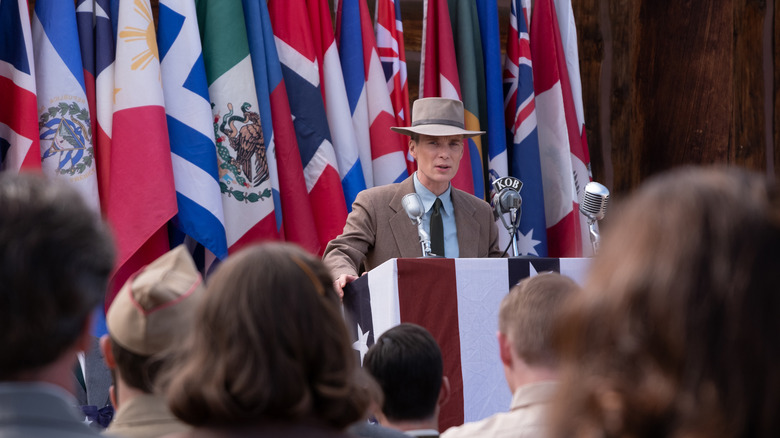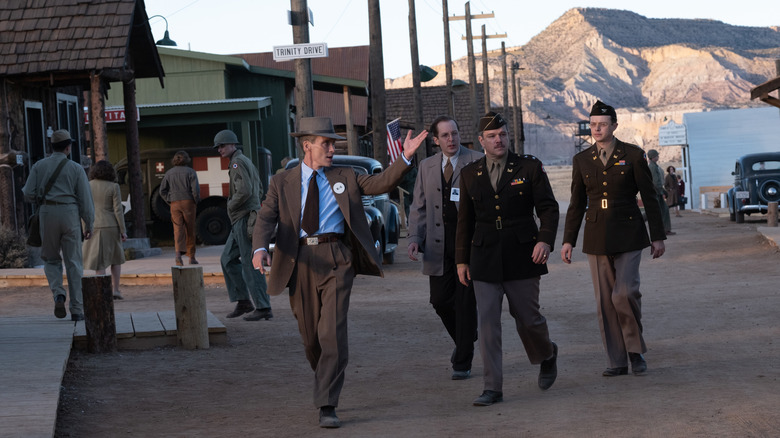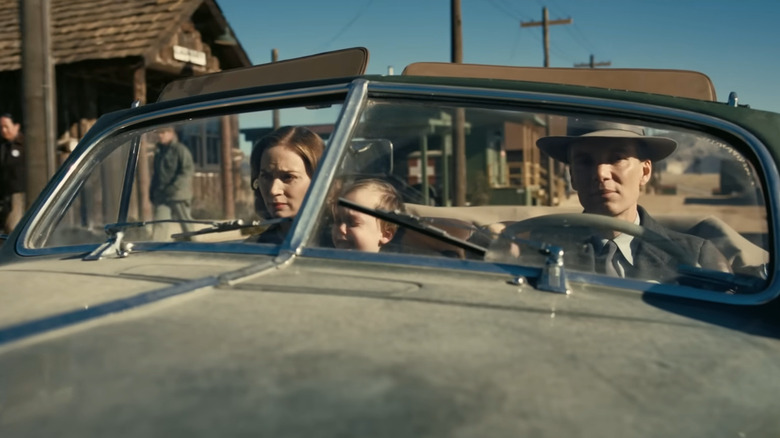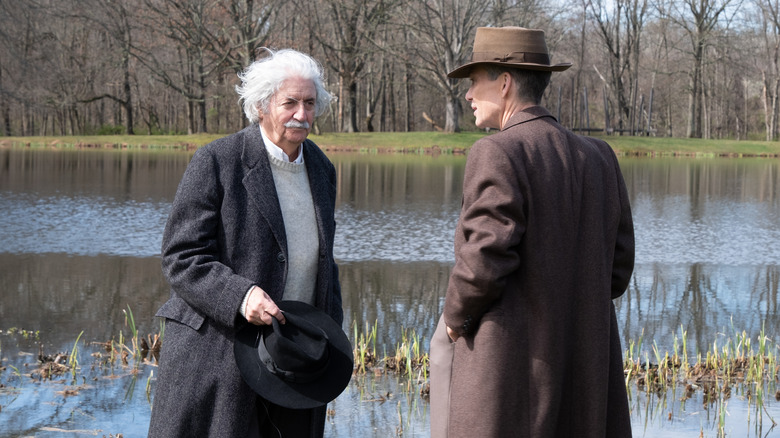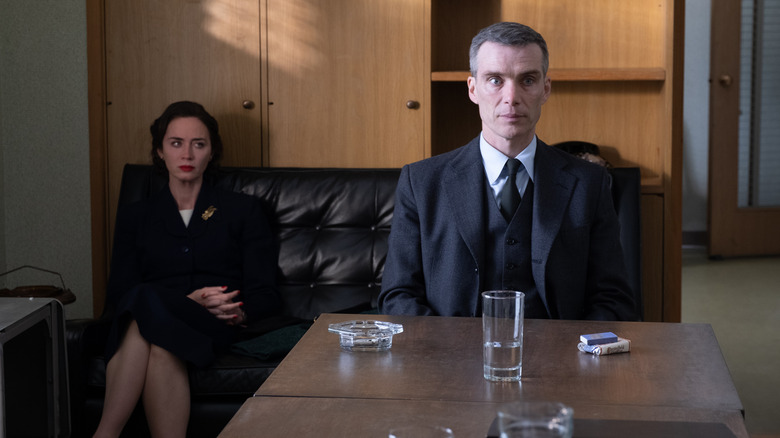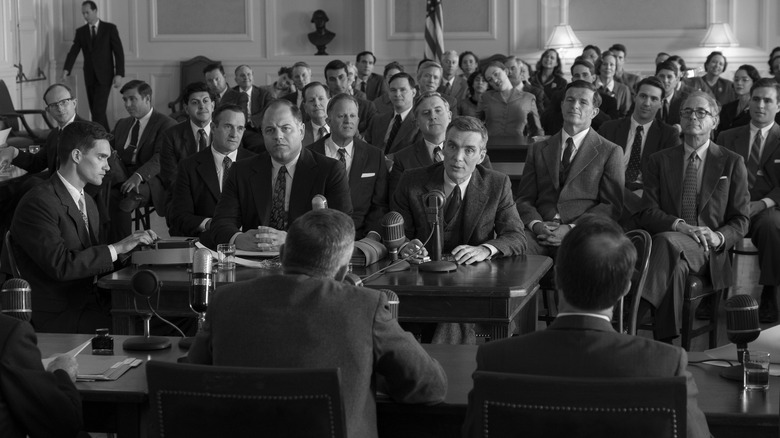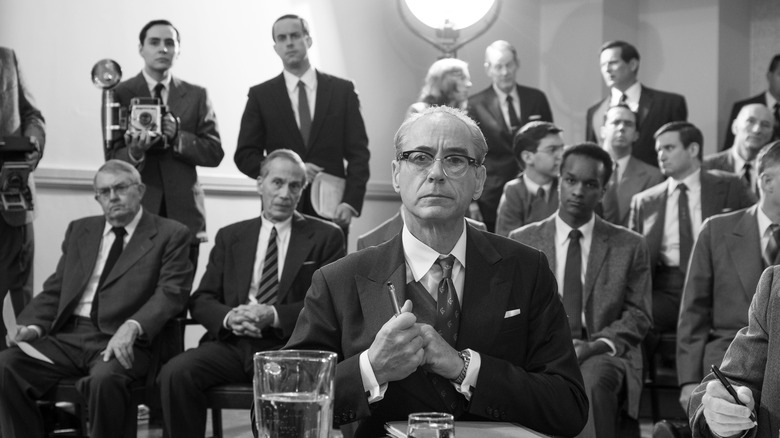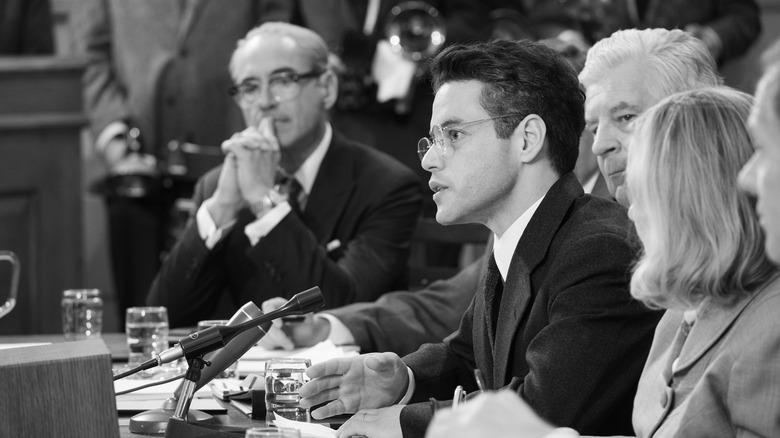12 Historical Facts That Oppenheimer Ignores
This article contains spoilers for "Oppenheimer."
Let's be fair, right off the bat: Christopher Nolan's "Oppenheimer," based on the Pulitzer Prize-winning book "American Prometheus" by Kai Bird and Martin J. Sherwin, is a remarkably accurate look into the life of American scientist J. Robert Oppenheimer (Cillian Murphy). It explores both his experiences working as the director of the Manhattan Project, fighting to build an atomic weapon before the Germans could manufacture their own, as well as the character assassination he endured at the hands of Lewis Strauss (Robert Downey Jr.) as a result of the left-wing ties he cultivated in his youth. Christopher Nolan brings his reliably detail-oriented vision to the project, endeavoring to get as close to the real version of history as possible.
But even with a three-hour runtime, it's inevitable that some historical facts are left by the wayside, whether timelines are consolidated to account for narrative flow, the roles of certain characters are shifted slightly, or elements of the overarching story are neglected. We expect this from most biopics because, at the end of the day, a movie is its own take on the story. But today, we're putting on our pedantic hats and taking a look at the spots where "Oppenheimer" and history diverge.
1. The J in J. Robert Oppenheimer
Early in the film, one of Oppenheimer's colleagues makes a comment about how the "J" in "J. Robert Oppenheimer" doesn't stand for anything. (This would not be particularly unusual for the time — famously, the "S" in "Harry S. Truman" doesn't stand for anything either.) But according to "American Prometheus," Oppenheimer's birth certificate confirms that the J stands for Julius, which was the name of his German Jewish immigrant father. It is perhaps likely that he never went by Julius or any derivative of that name because it's an uncommon practice in most Jewish communities to name babies after living relatives, at least in the Ashkenazi tradition, as it's considered to be bad luck.
That Oppenheimer's family didn't follow this particular superstition demonstrates their somewhat fractured relationship with Judaism. Raised by parents of a generation and class in which the primary goal was to assimilate to American culture, Robert Oppenheimer was Jewish by birth, but observed few religious practices. He was in fact educated primarily within the Ethical Cultural Society, a non-religious group founded by Jewish-born Felix Adler, who wanted to incorporate the elements of humanitarianism he considered cornerstones to Jewish culture without necessarily embracing Judaic faith.
2. The infamous apple incident
It's no secret to anyone familiar with Robert Oppenheimer's life that he had a hard time when he first left home for Cambridge to study physics in the prestigious Cavendish lab. He was considered by many contemporaries to be a little emotionally stunted and not quite mature enough for life on his own. Adding to these difficulties were the fact that he was training in a lab that focused on experimentation rather than theory, an environment in which the notoriously clumsy Oppenheimer did not thrive. Struggling to cope with stress and mental health issues, Oppenheimer impulsively poisoned an apple on the desk of his supervisor, Patrick Blackett.
In the film, he manages to discard the apple and it appears that no one is any the wiser, but in real life (although no one was actually hurt by his stunt) the school found out about what could be interpreted as attempted murder, and it was only with the swift intervention of Oppenheimer's parents that he avoided being expelled or even arrested. He was allowed to stay at Cambridge only under the condition that he met with a London psychiatrist on a regular basis.
3. The ranch in New Mexico
Ever since his teen years, Oppenheimer had a special affinity for New Mexico, a place where he felt more at home than anywhere else in the world. In the film, he mentions to his European colleagues that he misses New Mexico, and that he and his brother have a ranch there. But actually, although Oppenheimer had visited New Mexico several times before attending university in Germany, he and his brother did not own property there until much later.
Robert and Frank — with the financial support of their father — began leasing a ranch there in 1928, the year after Robert returned to the United States upon receiving his PhD, and Robert didn't actually purchase their small western estate, affectionately referred to as "Perro Caliente," until 1947. Still, the Oppenheimer brothers spent many happy months there, and it was Robert's knowledge of New Mexico that led him to suggest Los Alamos as the eventual site of the Manhattan Project.
4. Oppenheimer's teaching skills
Oppenheimer was by all accounts a unique personality in that social skills did not necessarily come easily to him, but like everything else in his life, he was a quick learner. After receiving his PhD and several offers to teach at various universities, he landed at Berkeley as an extremely green professor with little experience in teaching. "Oppenheimer" shows him connecting with students pretty much immediately, standing at the center of an engaged group of young physicists hanging on his every word. But that wasn't quite the experience that his very first advisees remember.
In "American Prometheus," Kai Bird and Martin J. Sherwin describe his teaching style as "largely incomprehensible to most students" and "more like a liturgy than a physics lecture." Even Oppenheimer admitted how much he had yet to learn about the art of lecturing. After describing some kindly advice given to him from a fellow professor at the time, he wryly said, "So you can see how bad it must have been."
Nevertheless, Oppenheimer eventually developed an ability to support and educate his students, which made the members of his physics department incredibly loyal to him, a skill that naturally complemented his role as director of the Manhattan Project. It was the strong relationships that he had cultivated as a faculty advisor that helped him recruit so many promising scientists to Los Alamos.
5. Running Los Alamos
Similarly, although Oppenheimer was a good choice to lead Los Alamos as a scientist — he intuitively understood how to assess problems in research and help his colleagues find new paths forward — he had little experience as an administrator. When Colonel Groves (Matt Damon) discusses the potential role with Oppenheimer, they mention the fact that none of his former associates considered him adept at the kind of logistical support such a massive project would require. (According to The Harvard Gazette, one commented that "he couldn't run a hamburger stand."). Still, in the movie Oppenheimer seems to have an innate grasp of how to compartmentalize the research in a way that would expedite the process and keep them ahead of the Germans, who had already embarked upon a similar project.
In reality, Oppenheimer had no clue how to run Los Alamos. John Manley, who worked under Oppenheimer on the Manhattan Project, remembered that he "bugged Oppie for I don't know how many months about an organization chart — who was going to be responsible for this and who was going to be responsible for that," a request that was dodged seemingly until Oppenheimer could avoid it no longer (via Science Madness). But again, the physicist proved to be endlessly adaptable, acquiring the skills and temperament required to head one of the most ambitious scientific endeavors in American history.
6. Opinions on Kitty Oppenheimer
Robert Oppenheimer's wife Kitty (Emily Blunt) is represented as a complicated woman in "Oppenheimer." She drinks too much, has trouble connecting with her children, and has a turbulent yet committed relationship with her husband (no small wonder, considering his affairs). But the film doesn't really address how Kitty was viewed within the Oppenheimer circle, which is that ... well, she wasn't very well-liked.
Their romance came about suddenly, when most of Oppenheimer's friends were still quite attached to Jean Tatlock, with whom he had been in a long-term on-again, off-again relationship. Upon learning that Oppenheimer was engaged to be married, his long-time friend and colleague Bob Serber reportedly wasn't sure if he had proposed to Kitty, or to Jean.
Robert's sister-in-law Jackie did not mince words about her feelings towards his new wife. She allegedly called her "one of the few really evil people I've ever known in my life" (per The Decadent Review). While most of his other friends and family members likely wouldn't have gone that far, many in their circle found her difficult, and were open with their opinion that Robert likely wouldn't have married her if she hadn't become pregnant with their son, Peter.
7. Do you want to adopt him?
In "Oppenheimer," Kitty makes a joke to their family friends, asking if they want to adopt Peter to take him off her hands. (This is after already relying upon the Chevaliers to watch him for a month or two when he was just a toddler.) Kitty's lack of attachment to her two children was well-documented, and the throwaway quip depicted in this scene actually had a much more serious grounding in reality. The only difference is that it wasn't Peter who the Oppenheimers offered up to another family, but his younger sister Toni.
Toni was born in the midst of Robert's work on the Manhattan Project, when he barely had time to sleep, let alone be a father. When Kitty suffered from what was likely postpartum depression and left Los Alamos to spend some time away to recuperate, she had one of her friends, Pat Sherr, take care of her infant daughter. "American Prometheus" recounts a moment when, upon visiting Toni at the Sherrs' home, Robert was struck by the feeling that he could not provide the same amount of love and attention as they could, and Sherr remembers him asking, "Would you like to adopt her?" Although the Oppenheimers maintained custody of both of their children, their home was not particularly emotionally warm, although friends and acquaintances spoke of memories in which both Kitty and Robert expressed great affection for Peter and Toni.
8. Einstein and Oppenheimer's relationship
Although Albert Einstein and Robert Oppenheimer were two of the most important scientific minds of the early 20th century, they weren't necessarily the best of friends. Oppenheimer considered Einstein's contributions, though valuable, entirely of the past by the time he was making his name in physics, and Einstein went on the record as being extremely skeptical about the entire field of quantum physics. Despite this, when they worked together at the Institute for Advanced Study in Princeton, New Jersey, they developed a cordial rapport that was based largely on mutual admiration for each other as men and not as physicists.
The scenes in the film that depict Einstein and Oppenheimer conversing at the Institute largely reflect what their actual relationship probably looked like. However, there's little evidence to suggest that Oppenheimer would have approached Einstein during his work on the Manhattan Project to double-check his math on the probability of the atomic bomb accidentally exploding the world. This is partially because they hadn't gotten a chance to get to know each other as individuals at this point — still several years away from working together at the Institute — and also because they were fairly open with the fact that they considered themselves on very different pages when it came to physics.
9. Wire-tapping Oppenheimer
A significant portion of "Oppenheimer" takes place during the closed-door hearing in which Robert Oppenheimer appeals the denial of his top-secret security clearance that would allow him to continue working as a government advisor. During this time, we learn that despite efforts to maintain high levels of security at Los Alamos, there was a German-born scientist employed on the Manhattan Project, Klaus Fuchs, who was reporting directly to the Soviets on their research. The film implies that Oppenheimer's inability to have identified espionage within his ranks was the precipitating factor in his being placed under increased scrutiny from the FBI, with surveillance that included wiretaps on all his phones.
But Oppenheimer ran in a very left-wing crowd before the war, and had been under strict surveillance since he was in his late 20s. The film makes reference to thousands of pages of documents on his past and various audio recordings of his conversations, which is why it seems odd that they choose to focus on this moment with Fuchs as a turning point in the government surveillance of Oppenheimer.
10. Oppenheimer's influence in Washington
The part of "Oppenheimer" that takes place after World War II emphasizes Robert Oppenheimer's inability to get the United States government to deal more openly with atomic energy, sharing their research with other countries and engaging in disarmament talks. It also casts him as a naive victim of Lewis Strauss' political machinations to discredit him, through confidential meetings that drag his name through the mud and prevented him from playing a more active role in the atomic conversation throughout the Cold War. And of course, it features the disastrous real-life interaction between Oppenheimer and Harry S. Truman, with the president of the United States calling the scientist a crybaby. None of this is necessarily untrue: In fact, that's pretty much what happened to Oppenheimer.
But by focusing on these elements of his post-WWII career, the film doesn't do credit to the influence that Oppenheimer actually wielded in Washington after the war. A greatly respected physicist, he had the ear of the most important men in government, even if he wasn't always able to convince them to act in ways counter to their fears about the Soviet Union's nuclear capabilities. He was an invaluable government advisor and was on a first-name basis with the U.S. Secretary of State — that's not nothing.
11. Strauss' nomination hearing
When we see Robert Downey Jr. as Lewis Strauss in the framing story of "Oppenheimer," he might look like he's on trial, but he's cool as a cucumber. The generally accepted wisdom during these scenes, in which Strauss is taking part in a nomination hearing to become the U.S. Secretary of Commerce, is that he's got the cabinet job in the bag. A Senate aide played by Alden Ehrenreich expresses no doubt that this is all just routine, that they have to go through the motions of a hearing, but that he'll eventually be granted the position is never in doubt. It's only when David Hill testifies against Strauss that the Senate reconsiders, narrowly preventing him from being awarded the prestigious role.
In fact, there was a contingent in the Senate that was determined to see him voted down. Strauss had an enemy in Senator Clint Anderson, and their relationship was so acrimonious that it was described in a 1959 Time article as a "blood feud." The result was a prolonged political battle that saw Eisenhower become just the fifth president to suffer the embarrassment of having a cabinet nomination rejected. And although Strauss' treatment of Oppenheimer was one reason why he wasn't confirmed, it was far from the lynchpin in the case.
12. David Hill's testimony
Towards the end of "Oppenheimer," it begins to feel like Lewis Strauss is a Scooby-Doo villain who's just gotten away with his dastardly deeds. His confirmation as U.S. Secretary of Commerce seems all but assured, granting him greater power and prestige in Washington. But then David Hill (Rami Malek) gives a damning character testimonial, accusing him of destroying Robert Oppenheimer's career for personal reasons and therefore lacking the temperament required for such a privileged role. The effect is immediate: Senators, including a young John F. Kennedy, switch their vote, delivering Strauss the comeuppance he desperately deserves.
David Hill did in fact speak out against Strauss during his cabinet hearing, saying that there was "a kind of madness and irrationality which went through the whole case" in Strauss' efforts to have Oppenheimer's security clearance revoked (per CQ Almanac). But Hill was not actually the only scientist who testified against Strauss at this hearing, railing dramatically against his treatment of Oppenheimer. There was another Los Alamos scientist, David R. Inglis, who was then the chairman of the Federation of American Scientists. Inglis spoke critically of Strauss a week earlier at the hearings, referring to his "substantial defects of character" and the "personal vindictiveness" with which he conducted his dealings with Oppenheimer. This stirred senators to doubt Strauss' fitness for the role long before Hill joined the hearing.
